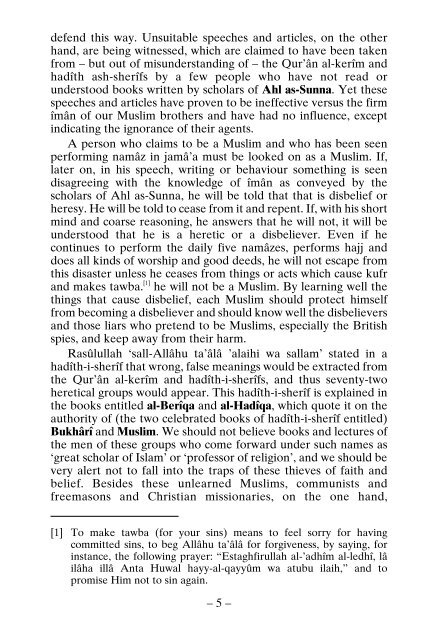Belief and Islam
BELIEF AND ISLAM star This work, Belief and Islam, originally was written in Persian under the title I’tiqâd-nâma by Hadrât Mawlânâ Khâlid al-Baghdâdî, a profound ‘âlim of Islam and a specialist in ma’ârif of tasawwuf. Hâji Faydullah Effendi of Kemah, a khalîfa of great walî Mavlânâ Mahmûd Sâhib, the brother of the author, translated the book into Turkish and named it Farâid-ul-fawâid which was printed in Istanbul in 1312 A.H.[1894]. Our bookstore had it translated again from the Persian original into Turkish and, some explanations and three chapters, published it with the title Imân ve Islâm in 1966. German, French and Arabic versions are also published by our bookstore. This book, explains five fundamentals of Islam, six fundamentals of îmân and the contemporary information about the matter and refutes those who are against Islam and those who are lâ-madbhabî.
BELIEF AND ISLAM
star This work, Belief and Islam, originally was written in Persian under the title I’tiqâd-nâma by Hadrât Mawlânâ Khâlid al-Baghdâdî, a profound ‘âlim of Islam and a specialist in ma’ârif of tasawwuf. Hâji Faydullah Effendi of Kemah, a khalîfa of great walî Mavlânâ Mahmûd Sâhib, the brother of the author, translated the book into Turkish and named it Farâid-ul-fawâid which was printed in Istanbul in 1312 A.H.[1894]. Our bookstore had it translated again from the Persian original into Turkish and, some explanations and three chapters, published it with the title Imân ve Islâm in 1966. German, French and Arabic versions are also published by our bookstore. This book, explains five fundamentals of Islam, six fundamentals of îmân and the contemporary information about the matter and refutes those who are against Islam and those who are lâ-madbhabî.
Create successful ePaper yourself
Turn your PDF publications into a flip-book with our unique Google optimized e-Paper software.
defend this way. Unsuitable speeches <strong>and</strong> articles, on the other<br />
h<strong>and</strong>, are being witnessed, which are claimed to have been taken<br />
from – but out of misunderst<strong>and</strong>ing of – the Qur’ân al-kerîm <strong>and</strong><br />
hadîth ash-sherîfs by a few people who have not read or<br />
understood books written by scholars of Ahl as-Sunna. Yet these<br />
speeches <strong>and</strong> articles have proven to be ineffective versus the firm<br />
îmân of our Muslim brothers <strong>and</strong> have had no influence, except<br />
indicating the ignorance of their agents.<br />
A person who claims to be a Muslim <strong>and</strong> who has been seen<br />
performing namâz in jamâ’a must be looked on as a Muslim. If,<br />
later on, in his speech, writing or behaviour something is seen<br />
disagreeing with the knowledge of îmân as conveyed by the<br />
scholars of Ahl as-Sunna, he will be told that that is disbelief or<br />
heresy. He will be told to cease from it <strong>and</strong> repent. If, with his short<br />
mind <strong>and</strong> coarse reasoning, he answers that he will not, it will be<br />
understood that he is a heretic or a disbeliever. Even if he<br />
continues to perform the daily five namâzes, performs hajj <strong>and</strong><br />
does all kinds of worship <strong>and</strong> good deeds, he will not escape from<br />
this disaster unless he ceases from things or acts which cause kufr<br />
<strong>and</strong> makes tawba. [1] he will not be a Muslim. By learning well the<br />
things that cause disbelief, each Muslim should protect himself<br />
from becoming a disbeliever <strong>and</strong> should know well the disbelievers<br />
<strong>and</strong> those liars who pretend to be Muslims, especially the British<br />
spies, <strong>and</strong> keep away from their harm.<br />
Rasûlullah ‘sall-Allâhu ta’âlâ ’alaihi wa sallam’ stated in a<br />
hadîth-i-sherîf that wrong, false meanings would be extracted from<br />
the Qur’ân al-kerîm <strong>and</strong> hadîth-i-sherîfs, <strong>and</strong> thus seventy-two<br />
heretical groups would appear. This hadîth-i-sherîf is explained in<br />
the books entitled al-Berîqa <strong>and</strong> al-Hadîqa, which quote it on the<br />
authority of (the two celebrated books of hadîth-i-sherîf entitled)<br />
Bukhârî <strong>and</strong> Muslim. We should not believe books <strong>and</strong> lectures of<br />
the men of these groups who come forward under such names as<br />
‘great scholar of <strong>Islam</strong>’ or ‘professor of religion’, <strong>and</strong> we should be<br />
very alert not to fall into the traps of these thieves of faith <strong>and</strong><br />
belief. Besides these unlearned Muslims, communists <strong>and</strong><br />
freemasons <strong>and</strong> Christian missionaries, on the one h<strong>and</strong>,<br />
[1] To make tawba (for your sins) means to feel sorry for having<br />
committed sins, to beg Allâhu ta’âlâ for forgiveness, by saying, for<br />
instance, the following prayer: “Estaghfirullah al-’adhîm al-ledhî, lâ<br />
ilâha illâ Anta Huwal hayy-al-qayyûm wa atubu ilaih,” <strong>and</strong> to<br />
promise Him not to sin again.<br />
– 5 –

















